Lynne Irons knows how to let plants just be plants. Sitting among rows of overgrown flowers and vegetables at her home in Vineyard Haven last fall, she cheerfully claimed to embrace a gardening ethos of “benign neglect.” On an island where manicured lawns, flower beds, and window boxes are considered the status quo, it’s admittedly a strange ethos to champion – especially if you make your living as a gardener. And yet that’s exactly what Irons has done for nearly thirty years.
Through good work and longevity, the owner of her own small gardening company, About Thyme, has earned a carte blanche to work the way she wants to work. She doesn’t advertise her gardening business, nor does she have the need. Many of her clients have been with her for twenty to thirty years. “I have good relationships with my people,” she explained. “I consider them my friends at this point.” Sometimes a property changes ownership and Irons continues to work the land. At that point, the new owners get an introduction to her signature style.
“I think I might actually have said a few things like, ‘This is your property, but it’s my garden,’” she recalled. “And they say, ‘Well, we tell you what to do, but you do what you want anyway.’”
Those who know her well will tell you this is just Lynne being Lynne. Her clients, for instance, know not to ask her to plant hydrangeas (“They’re boring!”), or to create fall arrangements of pumpkins next to mums, or to landscape using plants that will die within two weeks of being put in the ground. They also know not to expect her to wield a gas-powered leaf blower. (“Mowin’ and blowin’,” she described the practice with a heavy sigh and roll of the eyes.) Instead, she prefers to protect the Island’s native plants and she advocates for responsible care
of the planet.
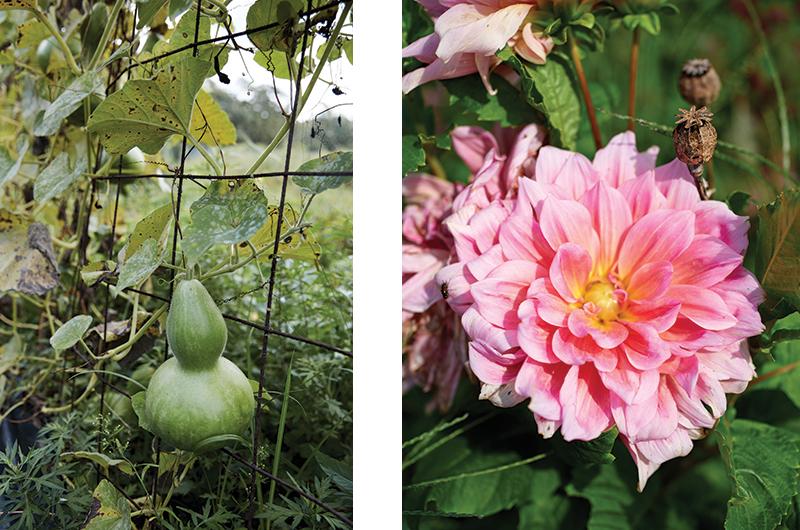
Her determined, headstrong ways extend to her personal life. Irons, after all, isn’t the sort to sit back and watch life unfold. For many years she held down various jobs while running a household and raising her three children – Jeremiah, Naomi, and Rueben Brown – as a single mother. She also built her thriving gardening business on her own.
She prides herself on her “back to the land” mentality, growing most of her own food and raising chickens and pigs for meat and eggs. She learned from a book how to kill a chicken. These days, she can kill and process two in forty-five minutes. Come wintertime, she stocks her pantry with row after row of hand-picked tomatoes, beans, and squash, cooked and preserved in Mason jars. Pride of place goes to the jars of dilly beans; her simple, straightforward recipe has been circulated by Islanders for decades.
And yet frequent readers of the Vineyard Gazette need not peek inside her home or backyard gardens, or even know her personally at all, to get a sense of where her convictions lie. For that, all they need to do is pick up a copy of the weekly newspaper, for which Irons has written the Vineyard Gardener column since 2007. Irons uses the space to dispense gardening knowledge, such as when to plant broccoli and daffodils or how to control weeds and ward off deer. She also extols the beauty of trees and flowers Island drivers pass by and probably can’t name. And yet there, at the end of each column, she lets her political opinions fly.
Over the years, she’s shared her views on Trump, Biden, and Harris, of course, but also on the state of schooling, the “willfully ignorant and misinformed” electorate, the “toxic reservoir about to burst in Tampa, Florida,” and even congress members’ salaries. “I cannot believe that the U.S. Congress whose members get an annual salary of nearly $200,000 regardless of actual time at work and, by the way, free health care for life, dragged their feet for months to give desperate Americans a one-time payment of $600,” she wrote in December of 2020.
To some, these weekly political screeds might seem out of place, or even downright inappropriate, for a gardening column. Irons doesn’t share those opinions. It was politics, after all, that originally brought her to Martha’s Vineyard more than fifty years ago. It was politics that shaped her world view. And it was politics that eventually led her to gardening.

Irons followed a winding path to the Island, starting in her hometown of Rew, Pennsylvania, set high up in the Appalachian Mountains. The small town was in oil country and she lived with an oil well in her backyard. “We used to swing on the pipes when we were kids. My friends and I would walk on lagoons of oil and it would undulate. We called it sink sock because you’d fall through.”
Her family’s conservative political views were so different from her own that she sometimes jokes she got dropped into the family from Mars. During her senior year of high school, President John F. Kennedy was assassinated. “That was it; that was the event,” she said. “It changed everything; it changed the world.”
She thinks her own political activism probably had its origins in that event, though her awareness of social justice had been growing slowly.
Whatever the origins, her budding activism brought her to North Texas State University with the altruistic goal of being a social worker – perhaps working on behalf of migrant workers. During summers at home in Pennsylvania, she often waitressed. One summer, however, she worked as a caseworker for the Department of Public Welfare, checking up on people receiving public benefits, such as food stamps. To Irons, it felt like policing people. “I think [that] was what really convinced me that we treat poor people terribly in our country,” she said.
After graduation, she moved to Washington, D.C., working first as an administrative assistant at George Washington University and then as a cocktail waitress at the Hotel America. Then came some trouble in 1970 that led to a weekend on the Vineyard, which became a lifetime. “I was involved in anti-war stuff in Washington, D.C.,” she recalled with a cryptic smirk. “There was some questionable behavior and, let’s put it this way, the F.B.I. was wondering what I was up to.”

She had visited the Island once as a young child when her family vacationed near an uncle stationed at Otis Air Force Base (now Joint Base Cape Cod). So when it was time for Irons and her then-boyfriend (and soon-to-be husband) to evade the political pressure in the nation’s capitol, she recalled pictures of the Gay Head Cliffs and thought, “Oh, let’s try there.” It was a bit of a random choice, she said, “like throwing a dart at a map.”
Over the course of a weekend in May of 1970, Irons hitch-hiked around the Island. “Nobody was here,” she recalled. The weekend passed quickly, and at some point during it, the pair decided not to return to the mainland. “I have no idea why I wanted to stay,” she now recalled. “We met a few people and they were fun. We had no money, no car; we had all of our belongings. It was hippie days, what can I say?”
Not long after that, she met Karen Berube, who stopped for the young hitchhiker. Berube took her to talk to Brooks Carter, owner of Carter’s Hardware and Electric store in Vineyard Haven. That intro led to Irons’s first place to live on the Island.
That first year, Irons set up camp near an abandoned miniature golf course on the Edgartown–Vineyard Haven Road in Edgartown. (The area is situated close to the present-day Felix Neck Wildlife Sanctuary.) “It was rough,” she recalled. “It was basically a wooden tent.” She noticed the wooden rails of the miniature golf areas were kind of like garden beds, even if they were falling apart. She decided to plant her first garden.
“It wasn’t because of a health kick,” she said. “I just didn’t have a car; I didn’t have a job. I thought, ‘I might as well throw some stuff in the ground….’ That whole garden was a failure. I got probably a colander of food out of it …. It was a big joke.
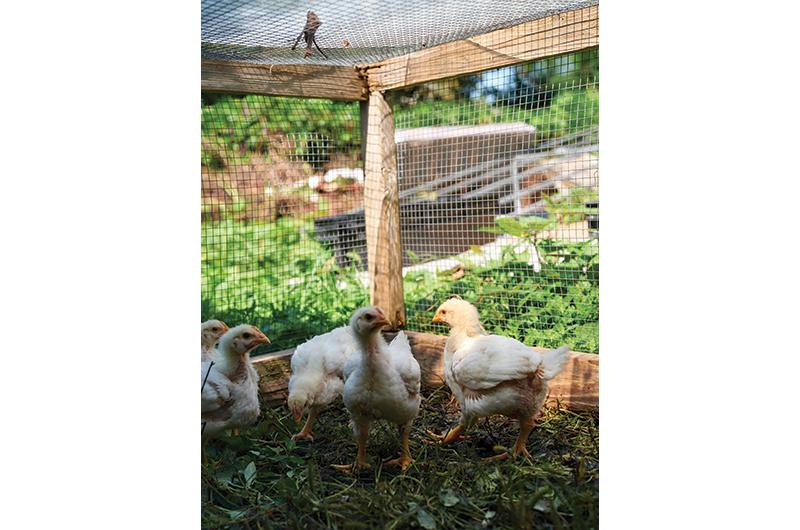
“But I got turned on to gardening. I wanted to figure it out. I wanted to do it right,” she said.
As the seasons changed, Irons found better accommodations. That winter – her first on the Island, during which her oldest son, Jeremiah, was born – she settled into a house on Lake Street in Vineyard Haven. She was alone all day, every day, and didn’t know anyone. The people she had met went home after the summer. She began to read seed catalogues as a way
to learn more about gardening.
“I pulled them out of the garbage bin at the post office,” she said with a laugh. “Everything I know, I learned from seed catalogues. I also read the Whole Earth catalogue. And Ruth Stout, the queen of gardens! She wrote How to Have a Green Thumb Without an Aching Back (Fireside, 1973). She wrote a lot of articles for the original Organic Gardening [magazine] published by Rodale, so I got a subscription to that…. Almost every week she had an article and I gobbled them up.”
In keeping with her Vineyard origin story, Irons came to possess the property she today still calls home in a suitably unconventional, 1970s way. As she tells it, in 1974, Ken Davies – the artist who created the logo for Wild Turkey bourbon – wanted to present an art exhibit in New York City but needed money to mount the show. Davies sold Irons and her then-husband the property for the amount he needed to do the exhibit. “This was all sand,” she said with a wave of her hand toward her property. “It was just a building lot.”
Only a trailer with a shell on top of it was in place in 1974. You wouldn’t know it today, Irons said of the home that sits across the street from the Tashmoo Overlook on State Road. “I brought in all the dirt and got manure from places where it was free. I brought in seaweed,” she said.
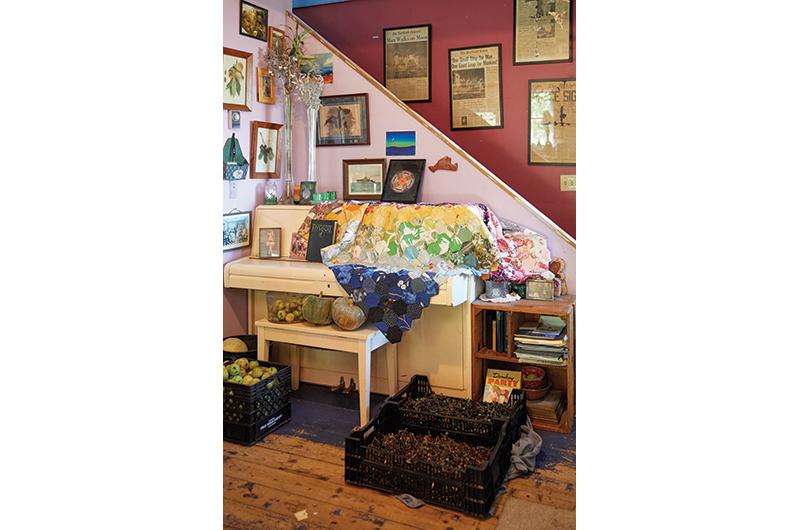
Over the years, Irons and her family constructed the house themselves – with some help from friends and local builders – cobbling together open rooms and gradually adding interior walls and shelving. Today, the house is nestled amongst tall pine and oak trees, ivy vines, and a maple tree. Approach it from one angle and you’ll spot a large hoop house and an impressive stack of split wood awaiting use in the wood stove inside. From the other side, you’ll find a grove of bamboo and a glint of a metal patio chair that’s been spray-painted gold and now resembles a throne hidden in a quiet spot with shady trees overhead.
The interior – which a visitor once described as reminiscent of Appalachia – reflects what Irons happily declares a “hippie house.” Framed newspapers memorializing historic moments from the 1960s and 1970s line the stairs from the kitchen to the second floor, and family photos cover bookshelves and wall moldings. The heart of the house is the farm-style kitchen, warmed by a large stove on which Irons cooks everything from the chickens she slaughters to vegetables to be canned that sustain her through the winters. The round table in the center invites visitors to sit and gab while cupping a warm mug.
Almost as soon as she became a homeowner, Irons began roughing out her own gardens and haphazardly putting in the trees, flowers, and bushes that have taken root over the past fifty years. As she began picking up caretaking and gardening jobs, she filled her own yard with daylilies and other plants discarded at properties she worked on. She learned about the Island’s native plants and soil conditions by talking to locals – notable horticulturalists Robert Norton, Gratia Harrington, Abigail Higgins, and Polly Hill among them – who handed down practical knowledge. Craig Kingsbury, her State Road neighbor, brought over the bamboo that now towers over Irons’s chicken house and keeps the animals safe from predators overhead. She’s especially proud of a sugar maple planted on her own property after buying it at the Felix Neck Seedling Sale: she remembers the year, 1977, because it was the same year that her second son, Reuben, was born.
As her experience and knowledge grew, she kept busy raising a family and – as Islanders do – holding down multiple jobs. She waitressed at the Black Dog Tavern in Vineyard Haven for about twenty-five years, which she calls “the little Ellis Island of the Vineyard; everybody worked there when they first arrived.” She also cleaned and shoveled snow at local churches. But by 1998, she left the Black Dog to focus on gardening full-time at her own company. Since then, About Thyme has become something of a family business: her children and grandchildren have worked with her at various points, with son Reuben and granddaughter Violet as mainstays of her crew.
In addition to her home gardens, and those of her clients, she has long grown plants, flowers, and some of her own food on a plot owned by the Goodale family off the Edgartown–Vineyard Haven Road in Oak Bluffs.
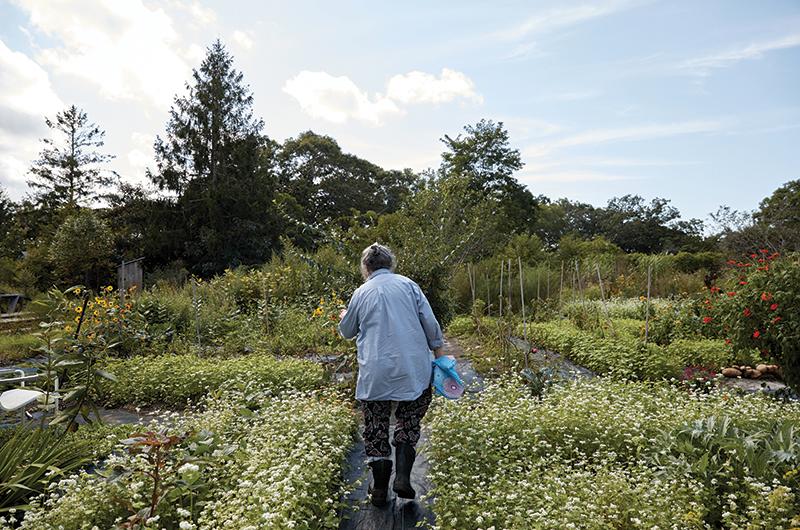
“When I first moved into my house, I asked Peter Goodale if I could put a garden in up at the pit,” she explained. “He said it would take a miracle to make something grow up there. Well, I grew a garden there for about thirty years! And then Peter said he wanted to give me a perfect square acre to grow on for ten or fifteen years. He brought me a big dump truck of manure and a chain-link fence, and I put in a well. He says he’s not going to take it away from me until I teach him all I know.”
The dispensing of gardening knowledge is something that Irons has grown accustomed to over the years through her Vineyard Gardener column. When Irons was first approached by former Vineyard Gazette editor Julia Wells to write the column, she was reluctant to accept. She described the job as “the last thing on earth” that she wanted to do. But once she started writing it, Irons built a relationship with the column, with the newspaper, and with readers. She holds dear a handwritten fan letter recently received from a nonagenarian, one of many such missives from the community over the years.
Since 2007, Irons has only missed two weeks of writing. “It’s an over-developed sense of responsibility,” she boasted. To date, she’s written more than 850 columns, which makes it no small feat to keep coming up with ideas. To combat writer’s block, she keeps a piece of paper in her truck and jots down things she notices or thinks about.
She writes her column longhand every Tuesday night and finishes Wednesday morning before leaving it on her kitchen counter for a Gazette reporter or editor to pick up. Sometimes the pages are found underneath eggs collected that morning from her chickens or a bunch of onions dug from her garden. Sometimes Irons makes time for a visit with the editor instead, especially if she is eager to talk about a news article, a local real estate transaction, or the latest changes in seasonal roadside displays of plants, flowers, and holiday icons.
No matter the season, Irons has gardening tips to give her loyal readers. Last January she described how she slathered expired liniment from her medicine cabinet all over her pea shoot flats in her greenhouse to deter rats. In May she bemoaned the never-ending encroachment of the invasive
plant species mugwort and Japanese knotweed. And as sure as spring turns to summer, readers can expect her annual observations about an overabundance of hydrangeas and why she doesn’t like them.
Plus, she is always ready to deliver a political rant or two.
At seventy-eight years old, that would seem plenty to keep her occupied. And yet – apart from the occasional gripe about arthritis in her hands, using a kneeling mat in the garden, and a T-shirt for work that proclaims “Everything hurts and I’m dying” – Irons shows little sign of slowing down. She and her crew work with about fifteen clients whose properties are spread out across the Island, diligently rotating frequent visits to them in all seasons and ensuring that the needs of soil and plants are always met.
“It’s not in my nature to put my feet up,” she scoffed. “I hope I don’t get to that. I grew up in Appalachia, so I am used to old people working.
“I’m grateful to be here,” she said of the Island she came to on a whim over fifty years ago. “I really lucked out.”

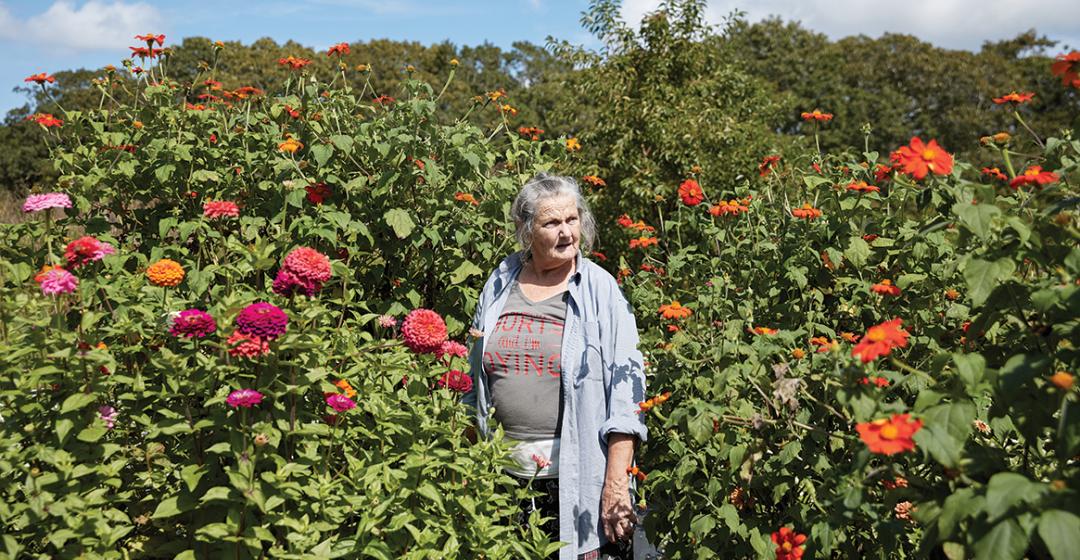


 3 comments
3 comments
Comments (3)